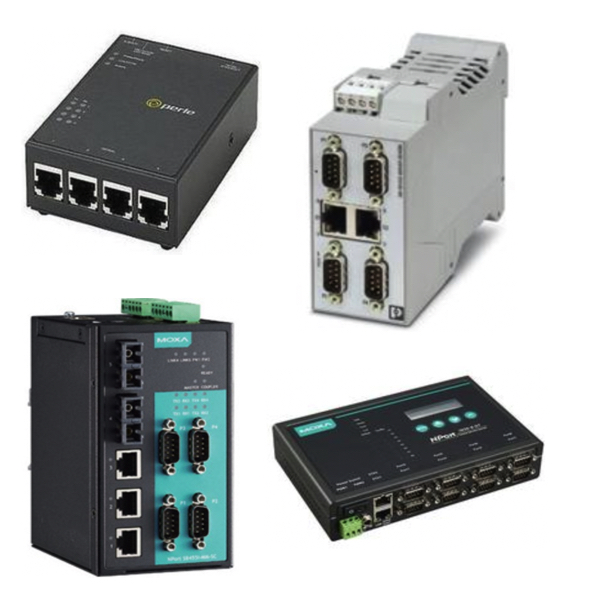Serial Device Servers

Serial device servers are industrial networking devices designed to connect legacy serial equipment to modern Ethernet networks. They convert serial communication protocols such as RS-232, RS-422, and RS-485 into network-based data, allowing traditionally isolated devices to be accessed, monitored, and managed over standard Ethernet infrastructure. Common applications include industrial machinery, barcode scanners, controllers, meters, and other serial-based equipment used in automation and control systems.
These devices operate using communication modes such as TCP server, TCP client, UDP, and serial tunneling to accommodate a wide range of network architectures. Rather than translating serial data into complex Ethernet device protocols, serial device servers encapsulate serial commands and transport them across the network intact. This approach preserves compatibility with existing software and control systems while enabling centralized access.
Industrial serial device servers are built for reliable operation in both office and factory environments. Many models offer rugged Ethernet interfaces, flexible power options, configuration utilities, and features such as surge protection and electrical isolation. By enabling secure remote access and centralized monitoring, serial device servers simplify troubleshooting, reduce the need for physical device access, and extend the service life of legacy serial equipment.
FAQs
Q: What is a serial device server used for?
A serial device server connects serial-based devices to an Ethernet network, allowing remote access, centralized management, and integration with modern network infrastructure.
Q: How does a serial device server differ from a serial converter?
A serial device server connects serial devices directly to an Ethernet network and supports network protocols such as TCP/IP, while a serial converter typically only converts between serial standards without network functionality.
Q: What communication modes do serial device servers support?
Many serial device servers support TCP server mode, TCP client mode, UDP, and serial tunneling to fit various network and application requirements.
Q: Can serial device servers improve network management?
Yes, serial device servers provide centralized monitoring and secure remote access, making troubleshooting and maintenance more efficient and reducing the need for physical access to devices.
Q: In a serial-to-Ethernet setup, can a serial port deliver data to a serial console?
Yes, in a serial-to-Ethernet configuration, a serial port can deliver serial data to a serial console, enabling communication and configuration of connected devices.
Why Buy Serial Device Servers from RSP Supply
RSP Supply offers a wide selection of industrial serial device servers designed to support reliable serial-to-Ethernet connectivity. These solutions help modernize legacy systems, improve network visibility, and simplify device management in industrial environments. Customers rely on RSP Supply for dependable industrial communication products, knowledgeable technical support, and solutions built for long-term performance in automation and control applications.

